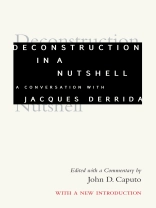This volume, now with a substantial new Introduction, represents one of the most lucid, compact and reliable introductions to Derrida and deconstruction available in any language.
Responding to questions put to him at a roundtable held at Villanova University in 1994, Jacques Derrida leads the reader through an illuminating discussion of the central themes of deconstruction. Speaking in English and extemporaneously, Derrida takes up with unusual clarity and great eloquence such topics as the task of philosophy, the Greeks, justice, responsibility, the gift, community, and the messianic. Derrida refutes the charges of relativism that are often leveled at deconstruction by its critics and sets forth the profoundly affirmative and ethico-political thrust of his work.
The roundtable is marked by an unusual clarity that continues into the second part of the book, in which one of Derrida’s most influential readers, John D. Caputo, elaborates upon Derrida’s comments and supplies material for further discussion.
This edition also includes a substantial new Introduction by Caputo that discusses the original context of the book and traces the development of deconstruction since Derrida’s death in 2004, from the rise of new materialisms to return to religion.
Long one of the most lucid and reliable introductions to Derrida and deconstruction available in any language, and an ideal volume for students, Deconstruction in a Nutshell will also prove illuminating for those already familiar with Derrida’s work.
Inhoudsopgave
Acknowledgements | xi
Abbreviations | xiii
Introduction (2020) : Specters of Derrida by John D. Caputo | xix
Part One
The Villanova Roundtable: A Conversation with Jacques Derrida
Part Two
A Commentary: Deconstruction in a Nutshell
1. Deconstruction in a Nutshell: The Very Idea (!) | 31
The Aporetics of the Nutshell | 31
The Axiomatics of Indignation (The Very Idea!) | 36
Apologia: An Excuse for Violence | 44
Nutshells, Six of Them | 47
2. The Right to Philosophy | 49
Of Rights, Responsibilities, and a New Enlightenment | 49
Institutional Initiatives | 60
Between the ‘Department of Philosophy’ and a Philosophy to Come | 69
3. Khora: Being Serious with Plato | 71
A Hoax | 71
Deconstruction is Serious Business | 74
An Exorbitant Method | 77
Khora | 82
Two Tropics of Negativity | 92
Differance: Khora is Its Surname | 96
4. Community Without Community | 106
Hospitality | 109
Identity Without Identity | 113
An Open Quasi-Community | 121
5. Justice, If Such a Thing Exists | 125
Doing Justice to Derrida | 125
Deconstruction and the Possibility of Justice | 129
The Gift | 140
Dike: Derrida, Heidegger, and Dis-junctive Justice | 151
6. The Messianic: Waiting for the Future | 156
The Messianic Twist in Deconstruction | 156
Faith Without Religion | 164
The Messianic and the Messianisms: | 168
-Which Comes First? | 168
-When Will You Come? | 178
7. Re-Joyce, Say ‘Yes’ | 181
Between Husserl and Joyce | 182
The Gramophone Effect | 184
Joyce’s Signature | 189
Inaugurations: Encore | 198
A Concluding Amen | 201
Bibliography | 203
Index of Names | 209
Index of Subjects | 213
Over de auteur
John D. Caputo is Thomas J. Watson Professor Emeritus of Religion at Syracuse University and David R. Cook Professor Emeritus of Philosophy at Villanova University. His most recent book is In Search of Radical Theology.












